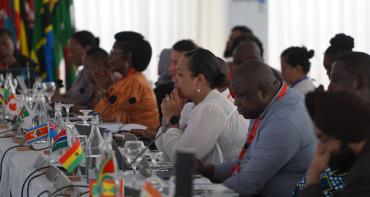Thousands of South Africans are set to benefit from stronger protections against cybercrime, following a Commonwealth symposium which equipped magistrates with practical skills to adjudicate online crimes.

Supported by the UK’s Foreign, Commonwealth and Development Office, the ĚÇĐÄĚ˝»¨ and the South African Judicial Education Institute hosted the symposium in Johannesburg from 25 to 27 November 2024.
Over three days, magistrates from across the country engaged in simulations and discussions to understand the complexities of cyber threats, the technologies exploited by criminals, and the online vulnerabilities of people and businesses in South Africa.
Using a series of fictional scenarios and group exercises, magistrates examined existing laws, agreements and domestic cases that can be applied to hold cybercrime perpetrators to account.
The symposium also focused on addressing the challenges magistrates face in evaluating the merits of electronic evidence and fostering cross-border cooperation for legal proceedings.
Opening the symposium, Justice Steven A. Majiedt of South Africa’s Constitutional Court described the country’s cybersecurity environment as both “dynamic and increasingly precarious”.
He said:
“In today’s digital age, the prevalence of cybercrime has grown significantly, often resulting in serious personal and financial harm to those who fall victim.
“Traditional, reactive law enforcement approaches are insufficient in a digital landscape where cybercriminals continually adapt their methods.”
While South Africa is one of the digital economy leaders in Africa, it remains one of the countries most affected by cybercrime, with annual losses exceeding ZAR 2.2 billion.
Justice Majiedt called for a comprehensive and innovative approach to address the escalating threat of cybercrime in South Africa.
Public benefit
Regional Court Magistrate Ulanda Labuschagne, one of the participants, thanked the UK government for funding the symposium, recognising that it introduced magistrates to international best practices for handling cybercrime cases.
“This will truly filter down to the members of the public,” she said. “When we preside over cybercrime cases, we will have a much better understanding of the technical aspects and the impact it has on other offences in South Africa.”
Senior Magistrate Chetna Singh, representing the Office of the Chief Justice of South Africa, also praised the symposium for its engaging approach.
She said she valued learning about tools used by cybercriminals to mask their identities and techniques, such as hashing, which is used to verify the origin of electronic evidence.
“As a trainer, there is much that I will take from this symposium to share with my colleagues who could not attend,” she said.
Lisa Weedon, the UK’s Deputy High Commissioner in South Africa, acknowledged that no institution or individual is safe from the threat of cybercrime, adding that it can erode basic human rights, destabilise growth and drain state revenues.
She said:
“Collective action and mutual resilience are critical to countering these ever-increasing cyber threats to protect our citizens and drive economic growth.”
Lisa expressed hope that the symposium would enhance the skills of the magistrates and promote greater prosecutorial opportunities.
In a video address, Commonwealth Assistant Secretary-General Professor Luis G. Franceschi shared the success of previous symposiums, pointing out that judicial officers in one country reported a 50 per cent improvement in handling electronic evidence.
This improvement, Professor Franceschi explained, ensured timely justice for victims and accountability for criminals.
He expressed optimism that the symposium would deliver similar results in South Africa.
Media contact
-
Snober Abbasi, Senior Communications Officer, Communications Division, ĚÇĐÄĚ˝»¨


